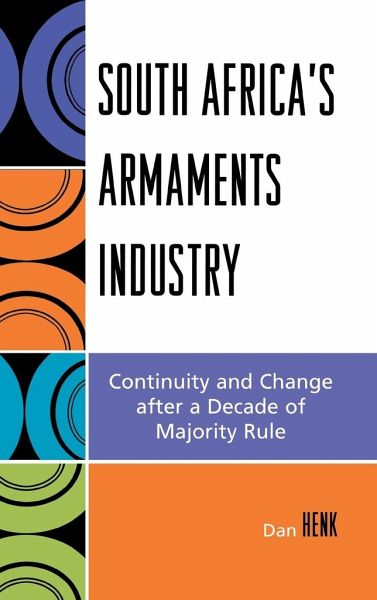
Dan Henk
Gebundenes Buch
South Africa's Armaments Industry
Continuity and Change after a Decade of Majority Rule
Versandkostenfrei!
Versandfertig in 1-2 Wochen
Weitere Ausgaben:

PAYBACK Punkte
47 °P sammeln!





In 1994, with the advent of majority rule, the new South African government faced the hopeful, yet sobering task of negotiating the country's past while crafting its future. Included in this process was South Africa's armaments industry, which had been an important pillar of the thoroughly discredited apartheid government. This book explores the significant historical and ideological obstacles the new South Africa overcame and the rehabilitation of the arms industry in the 1990s to serve and ultimately contribute to the country's redevelopment.
Dan's early career included a year and a half-stint drawing political cartoons for Madcap Magazine and illustrating underground projects such as Maximum Rock and Roll. In 1997, after struggling through a violent car crash and a knife fight with a crackhead that severed the tendon on his left thumb, he attended art school. Receiving some commercial and local gallery acclaim for his artwork, he moved to New York City in an attempt to kick-start an art career. Heavily immersing himself in the local hardcore scene, he produced artwork for the bands Shai Hulud, Indecision, Koshari, Unsound, Coalesce, Most Precious Blood, Locked in a Vacancy, Beyond Reason, and Zombie Apocalypse, not to mention various local record labels and venues. In 2000, he started tattooing, A year later, he was stricken with brain cancer. Three months after the surgery, he married fellow tattoo artist Monica Castillo. His work started appearing in both a growing number of tattoo magazines and more fine art-influenced tomes. Tragedy struck again in 2007, as his wife of 6 years, Monica Henk, was killed on a motorcycle by a hit-and-run driver. Despite extensive coverage in the local media and vigorous campaigns by both the tattoo and motorcycle communities, the culprit was never found. His first novel, The Black Seas of Infinity, was published by Anarchy Books in 2011, and he started an illustrated calendar featuring a variety of artists. Deadite Press released the first book with a cover by Dan, a novel entitled "The Sopaths" by Piers Anthony. A reissue of his debut novel was released by Permuted Press in April 2015, as well as a collection of his short stories entitled "Down Highways In The Dark...By Demons Driven" in August of the same year. He continued his work for independent magazines, doing art for Red Door Magazine, a slew of books by the imprint Out Of Step, and every issue so far of the British horror zine Splatterpunk.
Produktdetails
- Verlag: University Press of America
- Seitenzahl: 222
- Erscheinungstermin: 22. Juni 2006
- Englisch
- Abmessung: 235mm x 157mm x 18mm
- Gewicht: 518g
- ISBN-13: 9780761834816
- ISBN-10: 0761834818
- Artikelnr.: 21515897
Herstellerkennzeichnung
Libri GmbH
Europaallee 1
36244 Bad Hersfeld
gpsr@libri.de
Henk (U.S. Air War College) is well qualified to reveal the development of South Africa's armaments industry. South Africa's Achievement in the arms industry is astonishing, for under apartheid it faced limited resources and international sanctions. Yet the regime managed to foster manufacturing of excellent weapons in a short time (1976?89) and without export markets...Apartheid is gone and South Africa has changed; nuclear bombs have been dismantled, the arms manufacturing reorganized but the industrypreserved. Summing Up: RECOMMENDED. Graduate students and practitioners. -- F.L. Mokhtari, National Defense University CHOICE Henk (U.S. Air War College) is well qualified to reveal the development of South Africa's armaments industry. South Africa's Achievement in the arms industry is astonishing, for under apartheid it faced limited resources and international sanctions. Yet the regime managed to foster manufacturing of excellent weapons in a short time (1976-89) and without export markets...Apartheid is gone and South Africa has changed; nuclear bombs have been dismantled, the arms manufacturing reorganized but the industry preserved. Summing Up: RECOMMENDED. Graduate students and practitioners. -- F.L. Mokhtari, National Defense University CHOICE
Für dieses Produkt wurde noch keine Bewertung abgegeben. Wir würden uns sehr freuen, wenn du die erste Bewertung schreibst!
Eine Bewertung schreiben
Eine Bewertung schreiben
Andere Kunden interessierten sich für











